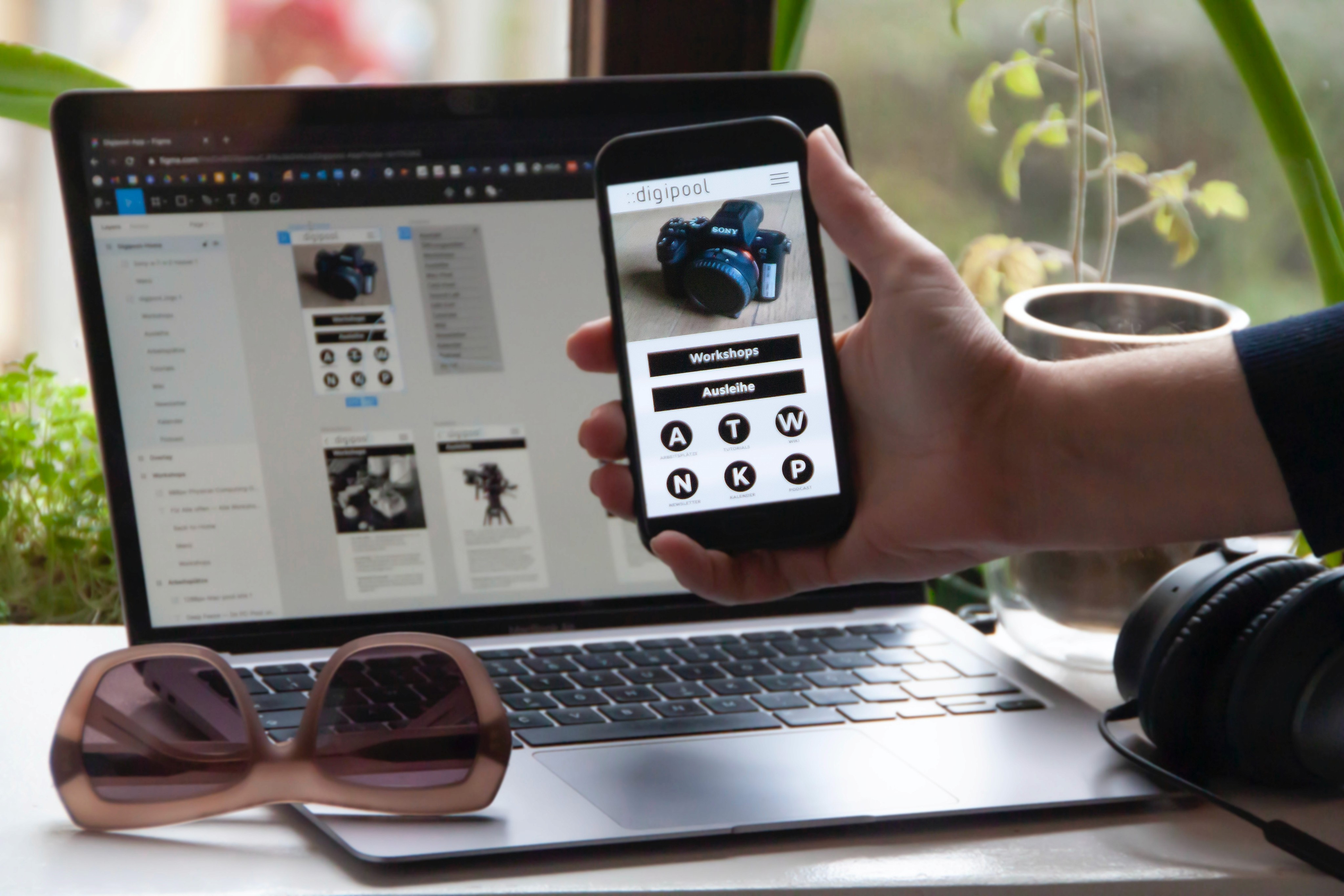

Richard Davis
Explore
UX Designer & Web Developer

Richard Davis
Explore

Richard Davis
Explore
UX Designer & Web Developer
The Importance of Spacing in UI Design

Richard Davis
Apr 1, 2023
Web Design
In UI design, spacing is one of the most important elements to consider. Proper spacing can help to create a more visually appealing and user-friendly interface, while poor spacing can make a design look cluttered and confusing. In this blog post, we will explore the importance of spacing in UI design and how it can impact the user experience.

When it comes to UI design, spacing is often overlooked or underestimated. However, proper spacing can play a crucial role in creating a well-designed and user-friendly interface. In this blog post, we will discuss why spacing is important in UI design and how it can impact the user experience.
Improves Visual Hierarchy
Proper spacing can help to create a clear visual hierarchy within your design. By using spacing to separate different elements, you can draw attention to the most important elements and make it easier for users to navigate your interface. For example, increasing the spacing between headings and body text can help to create a clear distinction between different sections of a page.
Increases Readability
Good spacing can also improve the readability of your content. By increasing the spacing between lines of text, you can make it easier for users to read and understand the content. Similarly, increasing the spacing between buttons and other interactive elements can make it easier for users to click on the correct element.
Creates a Sense of Balance
Spacing can also help to create a sense of balance within your design. By using spacing to create equal distances between elements, you can create a more visually appealing and harmonious design. This can also help to make your interface feel more organized and structured.
Enhances User Experience
Ultimately, good spacing can enhance the user experience by making your interface more intuitive and easy to use. By using spacing to create a clear visual hierarchy, improve readability, and create a sense of balance, you can create a design that is both visually appealing and user-friendly.
Best Practices for Using Spacing in UI Design
Use consistent spacing throughout your design to create a sense of harmony and balance.
Use negative space effectively to draw attention to important elements and create a sense of depth within your design.
Use spacing to create a clear visual hierarchy and guide users through your interface.
Avoid using too much spacing, as this can make your design look sparse and unappealing.
Pay attention to the relationship between elements and the space around them to ensure that your design is balanced and visually appealing.
In conclusion, spacing is a crucial element in UI design that can have a significant impact on the user experience. By using spacing effectively, you can create a more visually appealing, intuitive, and user-friendly interface that will help to improve engagement and conversion rates.

Richard Davis
Explore
UX Designer & Web Developer
The Importance of Spacing in UI Design

Richard Davis
Apr 1, 2023
Web Design
In UI design, spacing is one of the most important elements to consider. Proper spacing can help to create a more visually appealing and user-friendly interface, while poor spacing can make a design look cluttered and confusing. In this blog post, we will explore the importance of spacing in UI design and how it can impact the user experience.

When it comes to UI design, spacing is often overlooked or underestimated. However, proper spacing can play a crucial role in creating a well-designed and user-friendly interface. In this blog post, we will discuss why spacing is important in UI design and how it can impact the user experience.
Improves Visual Hierarchy
Proper spacing can help to create a clear visual hierarchy within your design. By using spacing to separate different elements, you can draw attention to the most important elements and make it easier for users to navigate your interface. For example, increasing the spacing between headings and body text can help to create a clear distinction between different sections of a page.
Increases Readability
Good spacing can also improve the readability of your content. By increasing the spacing between lines of text, you can make it easier for users to read and understand the content. Similarly, increasing the spacing between buttons and other interactive elements can make it easier for users to click on the correct element.
Creates a Sense of Balance
Spacing can also help to create a sense of balance within your design. By using spacing to create equal distances between elements, you can create a more visually appealing and harmonious design. This can also help to make your interface feel more organized and structured.
Enhances User Experience
Ultimately, good spacing can enhance the user experience by making your interface more intuitive and easy to use. By using spacing to create a clear visual hierarchy, improve readability, and create a sense of balance, you can create a design that is both visually appealing and user-friendly.
Best Practices for Using Spacing in UI Design
Use consistent spacing throughout your design to create a sense of harmony and balance.
Use negative space effectively to draw attention to important elements and create a sense of depth within your design.
Use spacing to create a clear visual hierarchy and guide users through your interface.
Avoid using too much spacing, as this can make your design look sparse and unappealing.
Pay attention to the relationship between elements and the space around them to ensure that your design is balanced and visually appealing.
In conclusion, spacing is a crucial element in UI design that can have a significant impact on the user experience. By using spacing effectively, you can create a more visually appealing, intuitive, and user-friendly interface that will help to improve engagement and conversion rates.
The Importance of Spacing in UI Design

Richard Davis
Apr 1, 2023
Web Design
In UI design, spacing is one of the most important elements to consider. Proper spacing can help to create a more visually appealing and user-friendly interface, while poor spacing can make a design look cluttered and confusing. In this blog post, we will explore the importance of spacing in UI design and how it can impact the user experience.

When it comes to UI design, spacing is often overlooked or underestimated. However, proper spacing can play a crucial role in creating a well-designed and user-friendly interface. In this blog post, we will discuss why spacing is important in UI design and how it can impact the user experience.
Improves Visual Hierarchy
Proper spacing can help to create a clear visual hierarchy within your design. By using spacing to separate different elements, you can draw attention to the most important elements and make it easier for users to navigate your interface. For example, increasing the spacing between headings and body text can help to create a clear distinction between different sections of a page.
Increases Readability
Good spacing can also improve the readability of your content. By increasing the spacing between lines of text, you can make it easier for users to read and understand the content. Similarly, increasing the spacing between buttons and other interactive elements can make it easier for users to click on the correct element.
Creates a Sense of Balance
Spacing can also help to create a sense of balance within your design. By using spacing to create equal distances between elements, you can create a more visually appealing and harmonious design. This can also help to make your interface feel more organized and structured.
Enhances User Experience
Ultimately, good spacing can enhance the user experience by making your interface more intuitive and easy to use. By using spacing to create a clear visual hierarchy, improve readability, and create a sense of balance, you can create a design that is both visually appealing and user-friendly.
Best Practices for Using Spacing in UI Design
Use consistent spacing throughout your design to create a sense of harmony and balance.
Use negative space effectively to draw attention to important elements and create a sense of depth within your design.
Use spacing to create a clear visual hierarchy and guide users through your interface.
Avoid using too much spacing, as this can make your design look sparse and unappealing.
Pay attention to the relationship between elements and the space around them to ensure that your design is balanced and visually appealing.
In conclusion, spacing is a crucial element in UI design that can have a significant impact on the user experience. By using spacing effectively, you can create a more visually appealing, intuitive, and user-friendly interface that will help to improve engagement and conversion rates.

Richard Davis
Explore
UX Designer & Web Developer
The Importance of Spacing in UI Design

Richard Davis
Apr 1, 2023
Web Design
In UI design, spacing is one of the most important elements to consider. Proper spacing can help to create a more visually appealing and user-friendly interface, while poor spacing can make a design look cluttered and confusing. In this blog post, we will explore the importance of spacing in UI design and how it can impact the user experience.

When it comes to UI design, spacing is often overlooked or underestimated. However, proper spacing can play a crucial role in creating a well-designed and user-friendly interface. In this blog post, we will discuss why spacing is important in UI design and how it can impact the user experience.
Improves Visual Hierarchy
Proper spacing can help to create a clear visual hierarchy within your design. By using spacing to separate different elements, you can draw attention to the most important elements and make it easier for users to navigate your interface. For example, increasing the spacing between headings and body text can help to create a clear distinction between different sections of a page.
Increases Readability
Good spacing can also improve the readability of your content. By increasing the spacing between lines of text, you can make it easier for users to read and understand the content. Similarly, increasing the spacing between buttons and other interactive elements can make it easier for users to click on the correct element.
Creates a Sense of Balance
Spacing can also help to create a sense of balance within your design. By using spacing to create equal distances between elements, you can create a more visually appealing and harmonious design. This can also help to make your interface feel more organized and structured.
Enhances User Experience
Ultimately, good spacing can enhance the user experience by making your interface more intuitive and easy to use. By using spacing to create a clear visual hierarchy, improve readability, and create a sense of balance, you can create a design that is both visually appealing and user-friendly.
Best Practices for Using Spacing in UI Design
Use consistent spacing throughout your design to create a sense of harmony and balance.
Use negative space effectively to draw attention to important elements and create a sense of depth within your design.
Use spacing to create a clear visual hierarchy and guide users through your interface.
Avoid using too much spacing, as this can make your design look sparse and unappealing.
Pay attention to the relationship between elements and the space around them to ensure that your design is balanced and visually appealing.
In conclusion, spacing is a crucial element in UI design that can have a significant impact on the user experience. By using spacing effectively, you can create a more visually appealing, intuitive, and user-friendly interface that will help to improve engagement and conversion rates.
The Importance of Spacing in UI Design

Richard Davis
Apr 1, 2023
Web Design
In UI design, spacing is one of the most important elements to consider. Proper spacing can help to create a more visually appealing and user-friendly interface, while poor spacing can make a design look cluttered and confusing. In this blog post, we will explore the importance of spacing in UI design and how it can impact the user experience.

When it comes to UI design, spacing is often overlooked or underestimated. However, proper spacing can play a crucial role in creating a well-designed and user-friendly interface. In this blog post, we will discuss why spacing is important in UI design and how it can impact the user experience.
Improves Visual Hierarchy
Proper spacing can help to create a clear visual hierarchy within your design. By using spacing to separate different elements, you can draw attention to the most important elements and make it easier for users to navigate your interface. For example, increasing the spacing between headings and body text can help to create a clear distinction between different sections of a page.
Increases Readability
Good spacing can also improve the readability of your content. By increasing the spacing between lines of text, you can make it easier for users to read and understand the content. Similarly, increasing the spacing between buttons and other interactive elements can make it easier for users to click on the correct element.
Creates a Sense of Balance
Spacing can also help to create a sense of balance within your design. By using spacing to create equal distances between elements, you can create a more visually appealing and harmonious design. This can also help to make your interface feel more organized and structured.
Enhances User Experience
Ultimately, good spacing can enhance the user experience by making your interface more intuitive and easy to use. By using spacing to create a clear visual hierarchy, improve readability, and create a sense of balance, you can create a design that is both visually appealing and user-friendly.
Best Practices for Using Spacing in UI Design
Use consistent spacing throughout your design to create a sense of harmony and balance.
Use negative space effectively to draw attention to important elements and create a sense of depth within your design.
Use spacing to create a clear visual hierarchy and guide users through your interface.
Avoid using too much spacing, as this can make your design look sparse and unappealing.
Pay attention to the relationship between elements and the space around them to ensure that your design is balanced and visually appealing.
In conclusion, spacing is a crucial element in UI design that can have a significant impact on the user experience. By using spacing effectively, you can create a more visually appealing, intuitive, and user-friendly interface that will help to improve engagement and conversion rates.

Richard Davis
Explore
UX Designer & Web Developer
The Importance of Spacing in UI Design

Richard Davis
Apr 1, 2023
Web Design
In UI design, spacing is one of the most important elements to consider. Proper spacing can help to create a more visually appealing and user-friendly interface, while poor spacing can make a design look cluttered and confusing. In this blog post, we will explore the importance of spacing in UI design and how it can impact the user experience.

When it comes to UI design, spacing is often overlooked or underestimated. However, proper spacing can play a crucial role in creating a well-designed and user-friendly interface. In this blog post, we will discuss why spacing is important in UI design and how it can impact the user experience.
Improves Visual Hierarchy
Proper spacing can help to create a clear visual hierarchy within your design. By using spacing to separate different elements, you can draw attention to the most important elements and make it easier for users to navigate your interface. For example, increasing the spacing between headings and body text can help to create a clear distinction between different sections of a page.
Increases Readability
Good spacing can also improve the readability of your content. By increasing the spacing between lines of text, you can make it easier for users to read and understand the content. Similarly, increasing the spacing between buttons and other interactive elements can make it easier for users to click on the correct element.
Creates a Sense of Balance
Spacing can also help to create a sense of balance within your design. By using spacing to create equal distances between elements, you can create a more visually appealing and harmonious design. This can also help to make your interface feel more organized and structured.
Enhances User Experience
Ultimately, good spacing can enhance the user experience by making your interface more intuitive and easy to use. By using spacing to create a clear visual hierarchy, improve readability, and create a sense of balance, you can create a design that is both visually appealing and user-friendly.
Best Practices for Using Spacing in UI Design
Use consistent spacing throughout your design to create a sense of harmony and balance.
Use negative space effectively to draw attention to important elements and create a sense of depth within your design.
Use spacing to create a clear visual hierarchy and guide users through your interface.
Avoid using too much spacing, as this can make your design look sparse and unappealing.
Pay attention to the relationship between elements and the space around them to ensure that your design is balanced and visually appealing.
In conclusion, spacing is a crucial element in UI design that can have a significant impact on the user experience. By using spacing effectively, you can create a more visually appealing, intuitive, and user-friendly interface that will help to improve engagement and conversion rates.